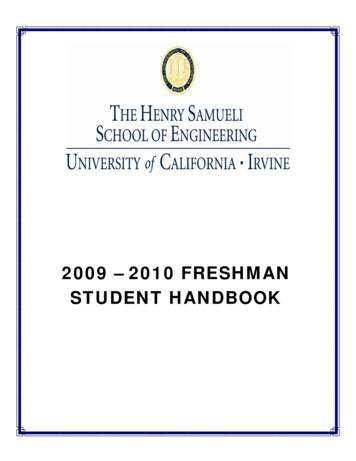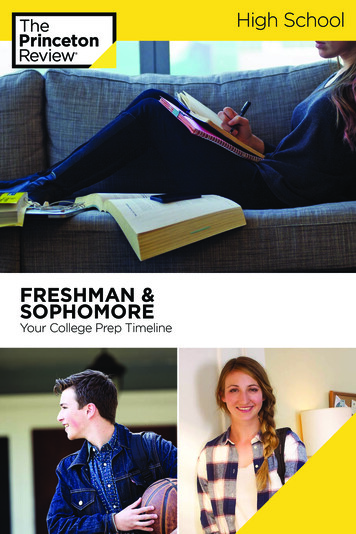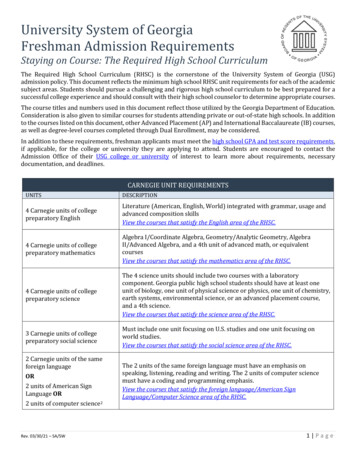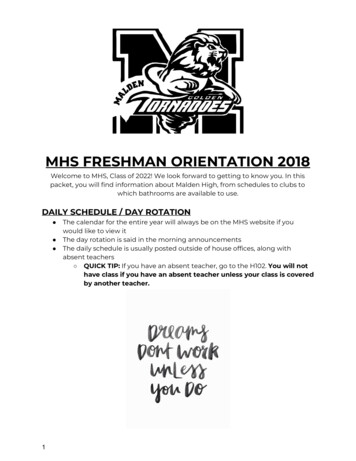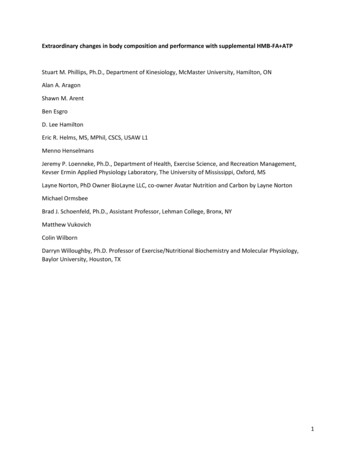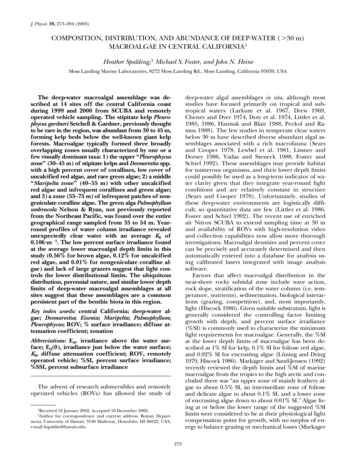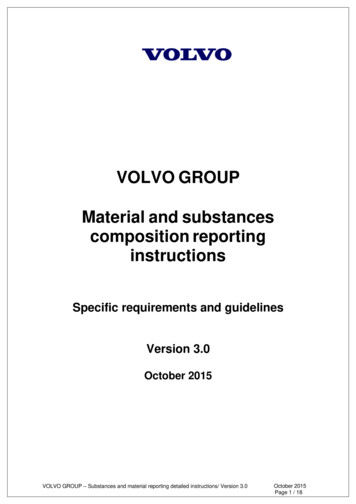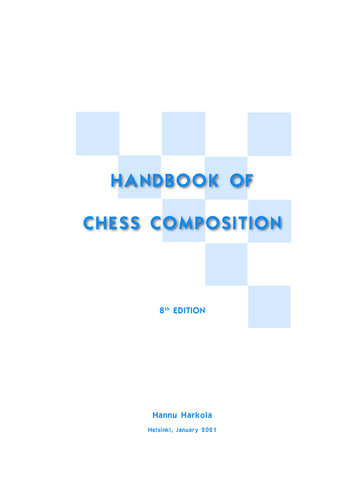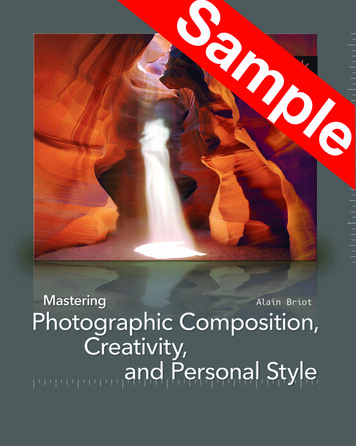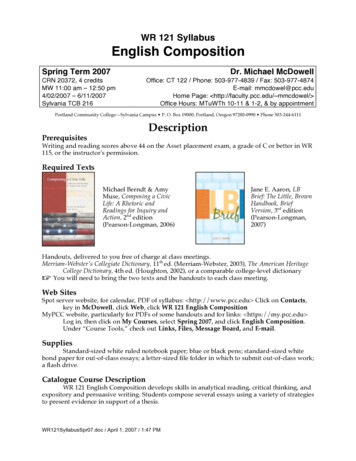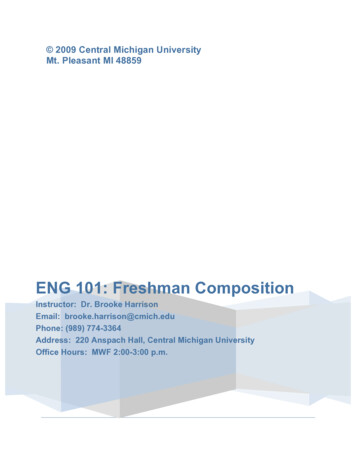
Transcription
2009 Central Michigan UniversityMt. Pleasant MI 48859ENG 101: Freshman CompositionInstructor: Dr. Brooke HarrisonEmail: brooke.harrison@cmich.eduPhone: (989) 774-3364Address: 220 Anspach Hall, Central Michigan UniversityOffice Hours: MWF 2:00-3:00 p.m.
ENG 101: Freshman Composition, 2009 Central Michigan UniversityTable of ContentsCMU Online Contact Info .3Welcome to English 101 @ CMU .3Pre-requisites .3Course Objectives .4Keys to Success in this Course.5Instructional Materials .5Required Textbooks .5How to Purchase Textbooks from MBS Direct .6How to Purchase Access to the e-Handbook from McGraw-Hill .7Grades .9The Essay Assignments . 10How to Submit Assignments to Bb. 10The Writing Skills Exams. 11How to Obtain a Proctor . 11How to Submit Exams to Bb. 12Class Policies . 13Revisions. 13Peer Review on Bb. 14Incompletes . 14Academic Honesty . 15Posting to the Discussion Board and/or Class Blog . 15Other Class Policies . 16Due Dates for Assignments, Exams, & Activities . 172 CMU
ENG 101: Freshman Composition, 2009 Central Michigan UniversityCMU Online Contact InfoToll free: 800‐688‐4268Fax: @cmich.eduAdmissions, Registration, GradesUndergraduate‐level 989‐774‐4461ocproc@cmich.eduCMU Writing CenterDon’t get frustrated with a writing assignment; get help from the CMUWriting Center online at http://webs.cmich.edu/writingcenterBe sure to review all sections of the CMU Online Student Orientation t.htmWelcome to English 101 @ CMU!Writing is a crucial part of your education at CMU, so all students are required to gain “writtencompetency” to graduate. The two required writing competency courses are ENG 101 and 201.These courses are designed to help you succeed at CMU and to help you graduate as a fluent,confident, and flexible writer.English 101 provides intensive practice in the intellectual and verbal habits required by a widevariety of public and academic writing, including careful reading, critical thinking, and coherentwriting. English 201 focuses on writing research‐based arguments, as well as helping studentslearn how to write about empirical data, which is sometimes necessary in creating persuasivearguments in some disciplines and professions. All writing in ENG 101 online will be completedusing MS Word and will be submitted to CMU’s course management system, Blackboard, for peerand instructor review.Pre-RequisitesCMU uses high school GPA and ACT scores to calculate a writing placement score for all incomingfreshmen. Traditional on‐campus students and non‐transfer students must have a writingplacement score of at least 58 to enroll in ENG 101.If you received a placement score of 51‐57, contact Dr. Rose Gubele, the Director of Basic Writing tofind out whether ENG 101 is the best option for you; ENG 103/099 might be better. She will ask youa few questions about your previous writing experiences and discuss your options.If you received a score of 50 or lower, you are required to take ENG 100 before taking ENG 101;however, you may also contact Dr. Gubele about completing a diagnostic essay so she and the Dir. ofComposition, can determine whether you qualify for a waiver of the ENG 100 requirement. Waiversare not automatic just because a student requests one.3 CMU
ENG 101: Freshman Composition, 2009 Central Michigan UniversityCourse ObjectivesComposing Processes: By the end of English 101, students should be able to understand that writing is a recursive process that usually requires multiple drafts;understand that writing is a means of discovery as well as a means of communication and beable to use writing for both purposes;develop flexible strategies for generating, revising, editing, and proofreading;understand and be able to responsibly perform collaborative aspects of writing processes,including critiquing their own and others’ works and implementing advice from the instructorand others; andUse computer word‐processing operations and other technologies to research, compose, revise,edit, and format papers.Rhetorical Knowledge: By the end of English 101, students should be able to understand that effective writers need knowledge of topics, genres, and rhetorical strategies;recognize that texts have rhetorical purposes and that successful writers negotiate therhetorical demands of differing discourse communities;write texts that define, restrict, and illustrate topics;form and evaluate effective theses or claims;evaluate and use a variety of different principles of organization in paragraphs and texts;adjust tone, diction, and content to different audiences; andFind, evaluate, analyze, and integrate with their own thinking appropriate primary andsecondary sources (e.g., textual, visual, and auditory sources) and understand when suchsources are necessary to a successful written text.Knowledge of Conventions: By the end of English 101, students should be able to understand the conventions associated with different genres, including the use of commonformats of different kinds of texts;be aware of the features of Standard Written English, especially those that distinguish it fromspoken English;write prose without clichés, verbosity, and monotonous syntax;write prose in Standard Written English free of errors that undermine the writer’s credibility,such as comma mistakes, spelling errors, and errors in agreement; andcite sources correctly.Other Course Goals: In addition to the major course objectives described in your textbook,you will also strive to acquire the following knowledge and behaviors: Self‐discipline: Develop good work habits, e.g., writing regularly, producing professional‐lookingwork, meeting deadlines and assignment requirements. Effective writing processes: Develop the habit of writing planning notes, writing drafts, thenrevising, proofreading, and editing. Rhetorical awareness: Develop skill in analyzing arguments and persuasive techniques. Developskill in writing for a variety of purposes and audiences. Critical thinking skills: Develop skill in analyzing and evaluating style and content in bothstudent compositions and published writing. Develop skill in presenting, both orally and inwriting, criticism of written composition. Mechanics of Standard Written English: Develop skill in proofreading, avoiding errors inspelling, English punctuation, usage, capitalization, syntax, etc. Manuscript conventions: Develop skill in following directions for manuscript preparation.4 CMU
ENG 101: Freshman Composition, 2009 Central Michigan UniversityKeys to Success in this ClassSome of the advice below comes from former students who have done well in this class. Some is myown advice extrapolated from many years of teaching the course to traditional and nontraditionalstudents in a variety of formats. Carefully read this syllabus and other materials posted on the course Bb site as well as anymaterials and email sent to you by your instructor. Don't underestimate the level of difficulty and amount of work required. You will not do well ifyou place the coursework at the bottom of your list of priorities. Succeeding in school—likeanything else—means making sacrifices, sometimes painful ones. Don’t procrastinate. If you try to complete the work at the last minute, its quality will suffer, aswill your grade. You will not receive a “C” or better this course if you wait until the last minuteto complete the assignments or to contact your instructor about what you don't understand. Carefully read and study the assigned chapters and articles in the textbooks and other coursematerials, including review and instructor revision suggestions, and incorporate into yourassignments the writing theories, strategies, and suggestions discussed there. Read and follow carefully the assignment and exam instructions in the syllabus, in the “Scheduleof Assignment & Activities” (on Bb), and in the exams you receive from your proctor. View the assignments, exams, and other class work from the perspective of the intendedreaders. One of the goals of this course is to get you to think more strategically about who mightread the documents you write. Never assume that anything you write is private, and don’tassume that your intended readers are only you classmates and instructor. In this course, allwriting is public in the sense that it is subject to review by your peers and instructor. Grades,however, are private. Proofread and edit your work carefully. Students will be held accountable for several aspects ofeffective writing: content, style, rhetorical effectiveness, grammatical correctness, etc. Studentswho enroll in ENG 101 are supposed to know the basics of Standard Written English. This classwill help you learn how to develop an appropriate and effective writing style, but if you don’talready grasp the fundamentals of correct grammar, punctuation, and usage, then you’reunlikely to earn a “C” in this course and should perhaps take ENG 100 first.Instructional MaterialsRequired TextbooksThere are two required hard copy textbook and one e‐handbook, which is discussed separately.When purchasing books, the most important piece of information is the ISBN, which is providedbelow for each book.1. Graff, Gerald, Cathy Birkenstein, and Russel Durst. They Say, I Say: The Moves that Matter inAcademic Writing, with Readings. New York: W.W. Norton, 2009. ISBN 978‐0‐393‐93174‐7.All students need to purchase this book from MSB Direct (see below) from the publisher, W. W. Norton (which is less expensive) 93174‐7/, or from Amazon.com iting‐Readings/dp/0393931749/ref sr 1 fkmr2 1?ie UTF8&qid 1278869199&sr 1‐1‐fkmr2Just make sure you get the correct edition! On‐campus student will NOT be able to purchase this5 CMU
ENG 101: Freshman Composition, 2009 Central Michigan Universitybook at the CMU bookstore or SBX, because the on‐campus sections of ENG 101 don’t use theedition with readings.2. Taylor, Marcy, Elizabeth Brockman, and Melinda Kreth, with Laura Grow. English 101: First Year Composition. 3rd ed. Dubuque IA: Kendall‐Hunt, 2008. ISBN 978‐0‐757‐55571‐8. For on‐ and off‐campus students, this book is available from MBS Direct; however, on‐campus students might be able to purchase a copy at the CMU Bookstore or SBX. There are also new and used copies available from Amazon.com athttp://www.amazon.com/s/ref nb sb noss?url search‐alias%3Dstripbooks&field‐keywords English 101%3A First‐Year Composition. Beware of the really cheap usedcopies—they might be missing pages.3. McGraw Hill e Handbook, 2009. ISBN 0077350340. This is e‐version of The McGraw HillHandbook, which is much less expensive than a traditional hard copy handbook, but you willhave four years of access, which will come in handy for the writing you will do in you otherclasses. The purchase price direct from McGraw‐Hill is 25.00. You may, of course, buy the hardcopy version, but it will be much more expensive.All students can purchase access directly from McGraw‐Hill (which costs less that buying fromthe bookstore) or from MBS (see below).On‐campus students can also purchase access from the CMU bookstore or SBX. Instructions forpurchasing the e‐handbook directly from McGraw Hill are provided below.How to Purchase Textbooks from MBS DirectWhen placing an order through MBS Direct, the following information is required: college oruniversity you are attending, site (location of class) or program, and complete courseinformation including EPN and course name. By internet: Save 20% on express UPS shipping (next day or 2nd day)! Safely ordertextbooks and other course materials online from the Virtual Bookstore. Payment mustbe made by credit card. The URL is http://direct.mbsbooks.com/cmu.htm By phone: Call 800‐325‐3252 to place an order or for shipping rates. Hours are Monday‐Thursday 7:00 a.m. – 10:00 p.m.; Friday, 7:00 a.m. – 6:00 p.m.; Saturday, 8:00 a.m. – 5:00p.m.; Sunday 12:00 p.m. – 4:00 p.m. CDT/CST. Payment can be made by credit card orpersonal check (must be mailed via U.S. postal service). Students ordering coursematerials to be shipped internationally should call: International Phone: 573‐441‐9179,International Fax: 573‐446‐5254.6 CMU
ENG 101: Freshman Composition, 2009 Central Michigan UniversityHow to Purchase Access to the e-Handbook from McGraw-HillTo purchase the access code directly from McGraw‐Hill,1. Go to http://www.mhprofessional.com/mhhe index.php and enter the ISBN in the Searchspace, as shown below. The ISBN is 0077350340Place your order in the screen shown below by clicking on the red “Add to Cart” Button:7 CMU
ENG 101: Freshman Composition, 2009 Central Michigan UniversityOnce you have purchased a registration code, you will need to use it to gain access:1. Go to http://mhconnectcomposition.com2. Click on First-time Registration.3. Enter the registration code your received when your purchased access and click “Submit.”4. Complete the account creation form, and click “Create Account” when finished.If you need help or have any questions about the e-handbook, visit the 24-hour online support center athttp://mpss.mhhe.com/products‐connect.php OR call 1‐800‐331‐5094.8 CMU
ENG 101: Freshman Composition, 2009 Central Michigan UniversityGradesThe course grade will be based on the following course work:Assignment 1: Responding to an Article (1,000 – 1,500 words)100 ptsAssignment 2: Rhetorical Analysis of an Editorial (1,000 – 1,500 words)150 ptsAssignment 3: Bibliographic Essay (1,500 – 2,000 words)200 ptsAssignment 4: Literacy Autobiography (1,500 – 2,000 words)150 ptsFour Writing Skills Exams (250 ‐500 words, 50 pts each)200 ptsOther Class Work (readings, textbook exercises, peer reviews, etc.)200 ptsTotal1,000 ptsYou can expect your instructor to review/grade and return your assignments and exams within oneweek after the due date; however, if you submit your work late, then your instructor cannotpromise to return your graded work within one week. (See Course Policies below for more aboutlate work.) Grades will be available on Blackboard under Course Grades, and will be updatedwithin 24 hours of a graded assignment being returned to you.A grade of “C” is the normal grade for this course, and students must earn a “C” (not a “C‐“) toreceive competency credit for this course. The grades of “A” and “B” are honor grades, indicating astudent has produced excellent or exceptionally good written work while meeting the minimumquantitative requirements. A grade of “C” means the student has adequately met the minimumquality and quantity standards of the course. Grades of “D” and “E” mean the student has not metthe minimum requirements either quantitatively or qualitatively.The grading criteria are listed on pages 3 ‐ 4 in your English 101: First Year Composition textbook.Each assignment will receive a letter grade (sometimes with a or ‐) as follows:A the writing has excellent adherence to grading criteria.B the writing has good adherence to grading criteria.C the writing has satisfactory adherence to grading criteria.D the writing has unsatisfactory adherence to grading criteria.E the writing has extremely unsatisfactory adherence to grading criteria. The assignmentmight have other problems that indicate it does not satisfy other requirements.The grading scale for the course is as follows:A 935 – 1,000 pts(93.5‐100%)C 735 – 764(73.5‐76.4%)A‐ 895 – 934(89.5‐93.4%)C‐ 695 – 734(69.5‐73.4%)B 865 – 894(86.5‐89.4%)D 665 – 694(66.5‐69.4%)B 835– 864(83.5‐86.4%)D 635 – 664(63.5‐66.4%)B‐ 795 – 834(79.5‐83.4%)D‐ 595 – 634(59.5‐63.4%)C 765 – 794(76.5‐79.4%)E0 – 594(0‐59.4%) 9 CMU
ENG 101: Freshman Composition, 2009 Central Michigan UniversityThe Essay AssignmentsAssignment 1: Responding to an ArticleThis assignment is described in Chapter 2 of your ENG 101: FYC textbook. The group of readingsreferred to in the assignment description includes those on pages 153 ‐ 481 in They Say, I Say.However, you may NOT write your Assignment 1 essay in response to David Zinczenko’s “Don’tBlame the Eater,” because everyone will be reading that essay in preparation for Writing SkillsExam 1. Your Assignment 1 essay should be 1,000 – 1,500 words, double‐spaced.Assignment 2: Rhetorical Analysis of an ArticleThis assignment is described in Chapter 3 of your ENG 101: FYC textbook. However, instead of yourinstructor providing you with a group of editorials on Blackboard, you will choose an article fromamong those on pages 149 ‐ 481 in They Say, I Say.However, you may NOT write your Assignment 2 essay about Gerald Graff’s “HiddenIntellectualism,” because everyone will be reading that essay in preparation for Writing Skills Exam2. Also, select a different article from the one you chose to respond to for Assignment 1. Your essayshould be 1,000 – 1,500 words, double‐spaced.Assignment 3: Bibliographic EssayThis assignment is described in Chapter 4 of your E101: FYC textbook. The purpose of this essay is foryou to inform your readers about the variety of viewpoints on one of the questions posed by the fourgroups of essays on pages 149 ‐ 481 in They Say, I Say: Is Fast Food the New Tobacco? (including “Don’t Blame the Eater” by David Zinczenko)Are 24, Family Guy, and Grand Theft Auto Actually Good for You? (including “HiddenIntellectualism” by Gerald Graff)Is Economic Mobility Just A Dream?Is America Over?Try to explore as many different sides of the issue as feasible. In other words, your essay shouldanswer the question, “What are the issues rele
ENG 101: Freshman Composition, 2009 Central Michigan University 3 CMU
